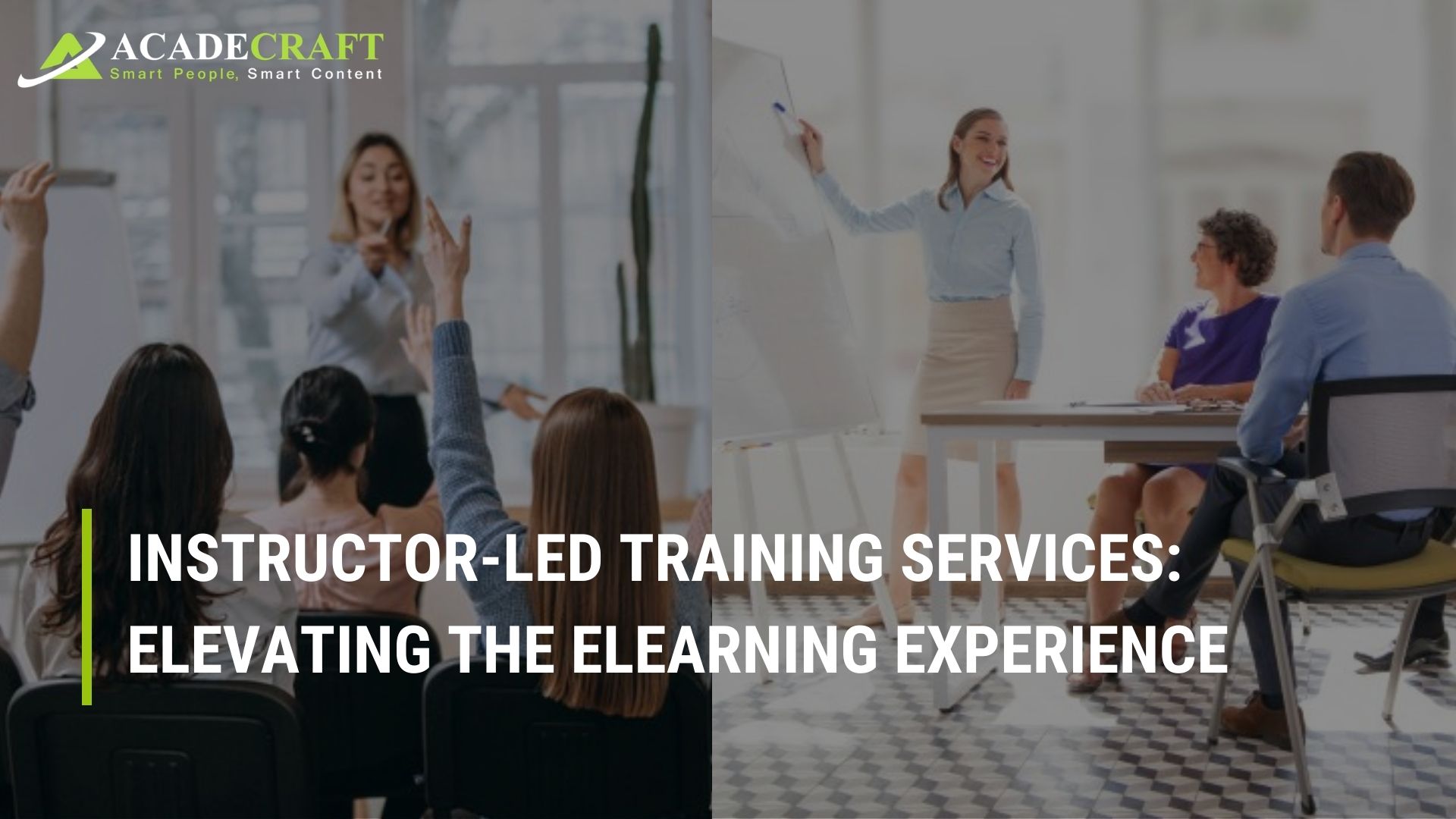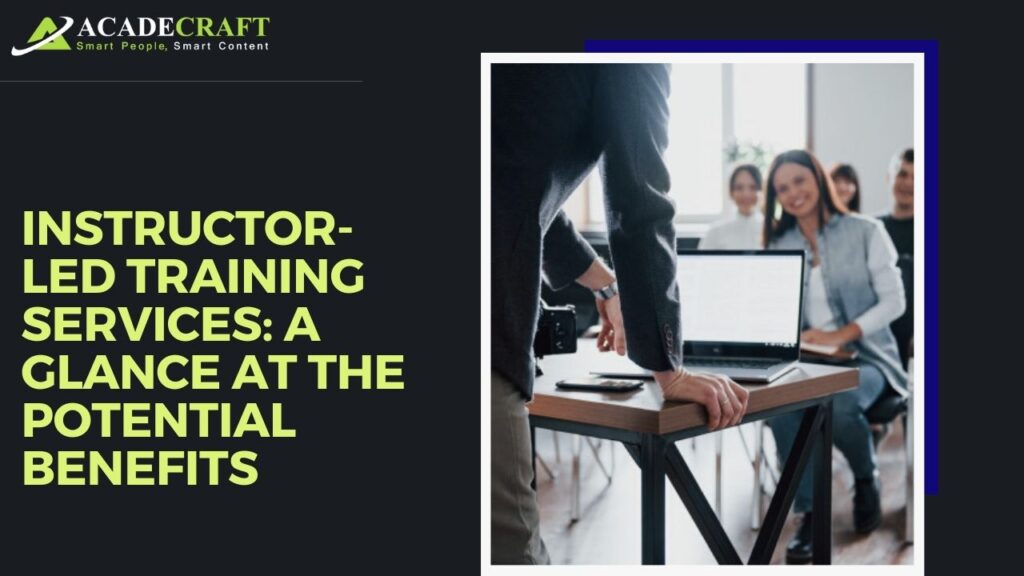
Before jumping into the details of Instructor-Led Training or ILT, here is a quick overview of ILT. Online Instructor-Led Training Services is an in-person live training session that involves a trainer, facilitator, and audience. All of them interact within a classroom that is similar to the ones we attended in school. The trainer is a Subject Matter Expert, and the facilitator is usually a technical expert who also takes care of all the logistics. So, the facilitator is responsible for finalizing schedules and communicating messages between the instructor and learners.
Now, there are two ways to host ILTs. It may be in classrooms away from work or on-site, i.e; in work locations themselves. A key benefit of Instructor-Led Training is the hands-on experience that trainers can have in the workspaces. They can learn to handle machines, software, and experiments in the classroom itself.
However, with the onset of the COVID pandemic, ILT has become challenging as it is difficult to maintain social distance. But, there is a catch. There is a type of ILT that can solve this issue. Often called the closed cousin, it is Virtual Instructor-Led Training (VILT).
VILT is a type of Instructor-Led Training that takes place in a virtual space. It is training led by instructors but not in-person. They use various video conferencing tools like Skype, Google Meet, Microsoft Teams, Slack, or GoTo Meeting. So, learners enjoy the same interactions and live feedback from the comfort of their homes or remote workspaces. It is also cost-effective as it saves the classroom and travel costs. Moreover, it saves time spent on getting ready for classes and traveling to the training location. But that lack of hands-on experience sometimes may prove to be a drawback.
Both ILT and VILT have their pros and cons. But the productivity of both learning modes depends on how Instructor-Led Training services enhance the advantages and minimize the drawbacks.
With increasing digitization, businesses worldwide struggle to offer the best learning and training programs to their customers and employees. So, there is a surge in demand for impactful ILT courses to increase learner engagement and productivity. In-house experts are not the best choice for ILT module development because they lack technical knowledge and experience. In addition, they result in high overhead costs for the company. So, clients rely on online Instructor-Led Training services instead.
However, many companies claiming to provide the best Instructor-Led Training services crowd the market today. But not all are equally qualified, so clients must be careful before partnering with any such agency. Hence, in this blog, we will discuss the various key points that a client must look for in online Instructor-Led Training services.

Let us look at the few features that can help clients pick out the best suited online Instructor-Led Training services provider for all their needs. Let us go through them one at a time.
It is an essential feature that all professional online Instructor-Led Training services must provide. Every client is different and so are their requirements and expectations. So, service providers must keep an open mind and design ILT modules accordingly. The modules must integrate features that help clients meet all the learning goals and business targets.
Reputed Instructor-Led Training services must supplement their ILT courses with engaging tools. These tools may comprise surveys, polls, pop-up quizzes, animated videos, virtual labs, and more. Clients must develop these tools because they facilitate easy learning and higher productivity of both academic learners and corporate trainees.
To create quality ILT modules, the agency must have qualified Subject Matter Experts (SMEs), technical experts, and academic writers. Moreover, they should also have experienced software experts who can develop LMSs, interactive videos, and mobile applications, if needed. The experts must work collaboratively to design courses that meet the curriculum needs and training objectives.
Clients must ensure that the agency they are partnering with delivers optimal services at reasonable rates. Many look for cheap services but end up receiving poor-quality content. But at the same time, they also should not settle for overpriced solutions. So, clients must carefully compare services and costs and agree at a competitive rate that guarantees quality services by qualified teams.
Irrespective of the volume of content, professional Instructor-Led Training services must deliver on time. It reflects that they value time and follow a proven workflow. They must provide learning and training modules at regular intervals so that, learners have access to continuous lessons and assessments. On-time delivery is necessary as it facilitates continuity of courses.
All online Instructor-Led Training services must provide round-the-clock customer support. In addition to facilitating the maintenance of onshore and offshore client relationships, it also allows developers to accommodate all last-minute changes. Constant communication between the agency and clients guarantees satisfying results at all times.
Most of the time, clients have their in-house instructors. But sometimes, clients may need to outsource instructors as well. So, agencies must connect the client with highly qualified SMEs whenever they need it. Depending on the training needs, the instructor's qualifications may differ, so agencies must deliver accordingly.
Developing courses is essential but ensuring that all modules are engaging and scheduled in a sequence is equally vital. So, clients must ensure that the agency provides well-structured courses for effective concept delivery. The scheduled classes must also include slots for assessments and tests at regular intervals.
Clients must emphasize developing ILT modules with services that have all the mentioned qualities. They must not compromise at any cost because the content of the ILT modules determines the productivity levels of learners.
Hence, they must always partner with Instructor-Led Training services providers that boost the client?s ROI, learner engagement, and understanding. No matter how complicated the learning objectives may be, the agency must meet all through effective planning and execution.
Share